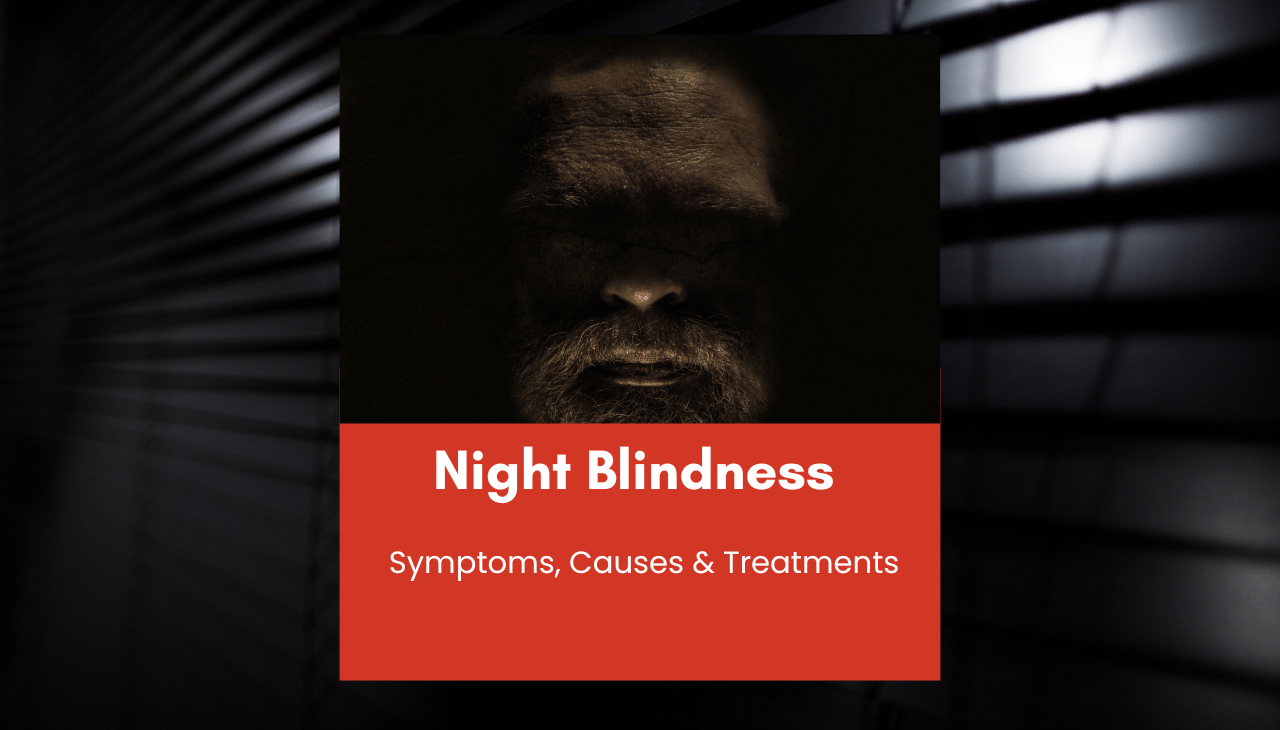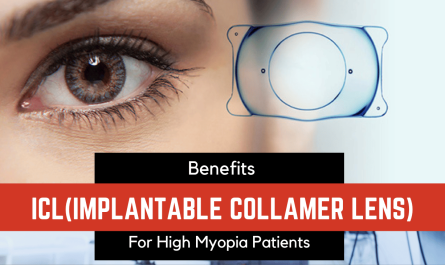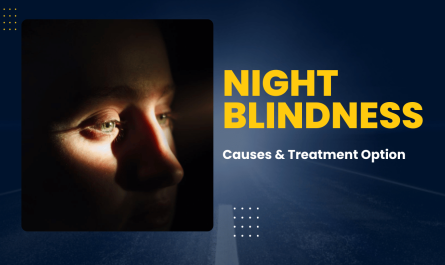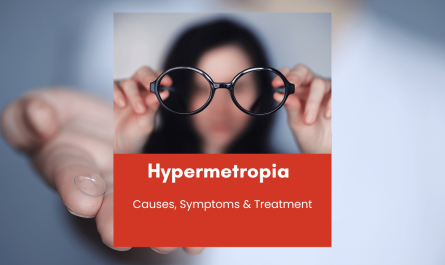Finding it difficult to see once the sun sets? You could be experiencing night blindness, a condition that affects millions globally but often goes unnoticed until it severely impacts daily activities. Night blindness, or nyctalopia, isn’t a disease itself but a symptom of various underlying health issues.
In this blog, we’ll cover everything you need to know about night blindness—its symptoms, causes, lifestyle adjustments, treatment options, advanced techniques, after-care tips, cost in Mumbai, and how professional help at Laxmi Eye Hospital can make a difference.
What is Night Blindness?

Night blindness refers to impaired vision in low-light conditions. People suffering from this condition struggle to adjust their eyes between different lighting environments, making activities like driving at night or walking through dim areas challenging.
Symptoms of Night Blindness
Identifying symptoms early can help in timely diagnosis and treatment. Key signs include:
- Blurry or unclear vision in dim light
- Difficulty adapting from bright to dark areas
- Trouble recognizing faces or objects at night
- Delayed focus adjustment indoors
- Frequent tripping or stumbling in poorly lit areas
Common Causes of Night Blindness
Several medical and environmental factors can trigger night blindness:
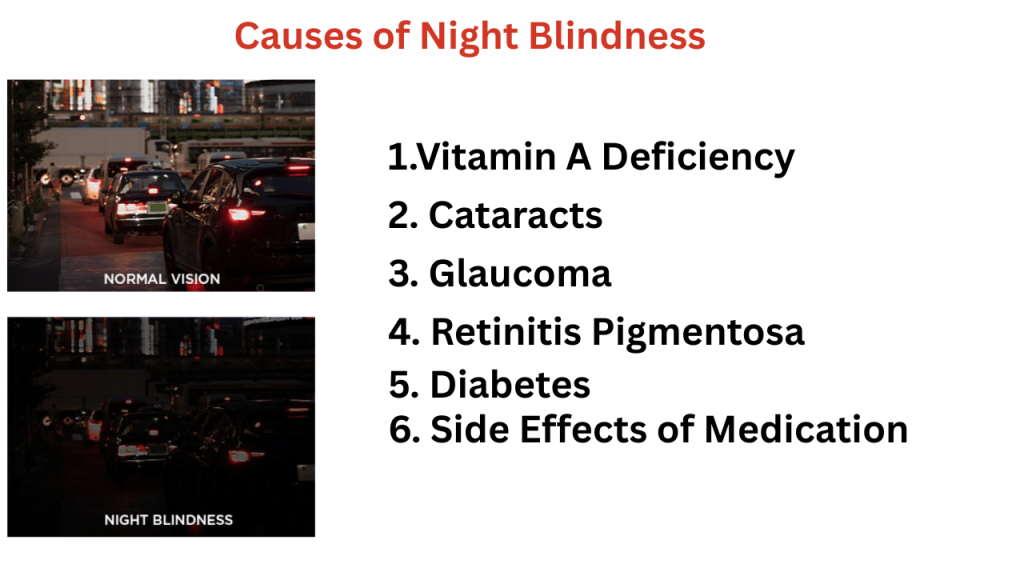
- Vitamin A Deficiency: Essential for retinal health.
- Cataracts: Cloudy lenses scatter light, causing hazy night vision.
- Glaucoma: Elevated eye pressure affects the optic nerve.
- Retinitis Pigmentosa: A genetic disorder damaging the retina.
- Diabetes: Can lead to diabetic retinopathy affecting night sight.
- Side Effects of Medication: Some drugs impair light adaptation.
Lifestyle Changes to Manage Night Blindness
Small changes can make a big difference in improving quality of life:
- Enhance indoor lighting with brighter, evenly distributed lights.
- Eat a vitamin A-rich diet: carrots, spinach, sweet potatoes, and fish oils.
- Wear anti-glare glasses especially for night driving.
- Control chronic conditions like diabetes and hypertension.
- Regular Eye Check-ups to catch any progressing issues early.
Advanced Techniques for Treating Night Blindness
Modern ophthalmology has made impressive strides. Depending on the cause, advanced techniques include:
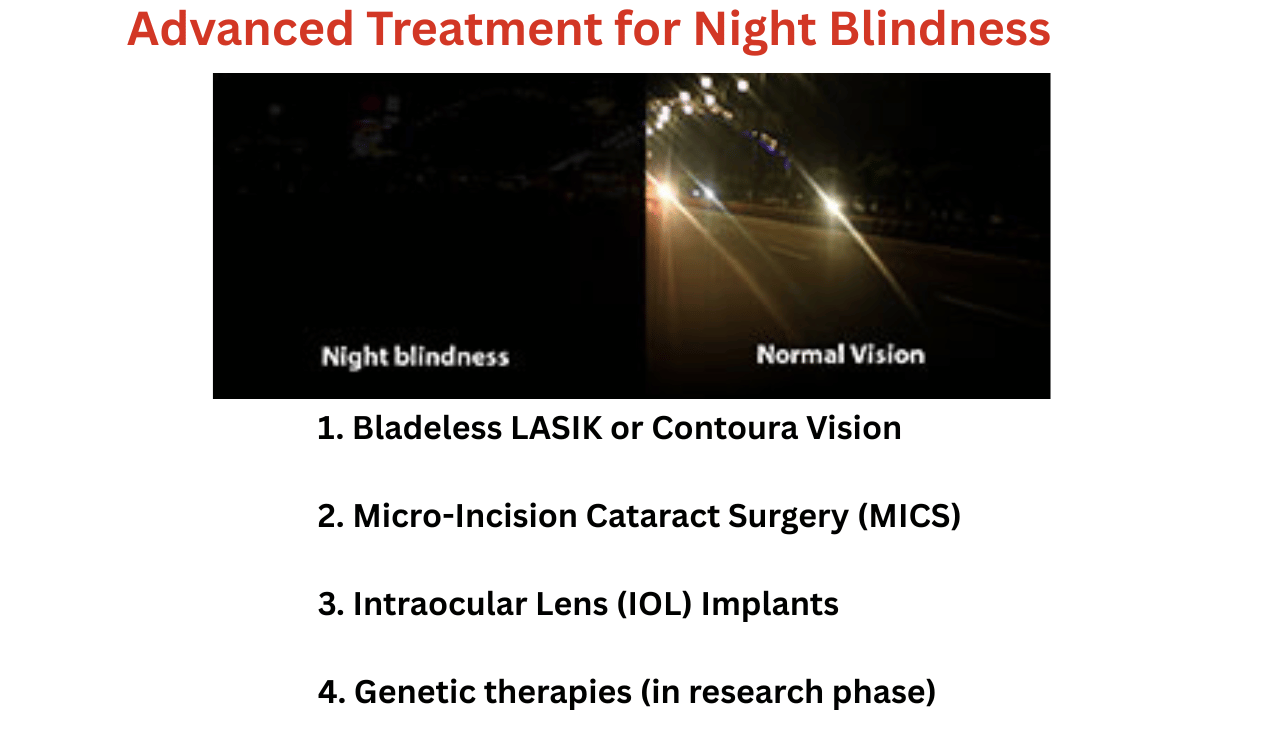
- Bladeless LASIK or Contoura Vision: For refractive errors.
- Micro-Incision Cataract Surgery (MICS): For precise cataract removal.
- Intraocular Lens (IOL) Implants: Restores clear vision after cataract surgery.
- Anti-VEGF Injections: For diabetic eye diseases.
- Genetic therapies (in research phase): For inherited retinal diseases like retinitis pigmentosa.
After-Treatment Care and Management
Successful treatment doesn’t end with surgery or medication; proper after-care is crucial:

- Follow the prescribed medication or eye drop schedule strictly.
- Protect your eyes from harsh light for a few weeks post-treatment.
- Attend all follow-up visits for monitoring and adjustments.
- Maintain a healthy diet rich in antioxidants and vitamins.
- Avoid strenuous activities like heavy lifting immediately after surgeries like cataract removal.
- Report any sudden changes like flashes, floaters, or pain immediately to your ophthalmologist.
Cost of Night Blindness Treatment in Mumbai
Treatment cost can vary based on the cause and procedure:
| Treatment Type | Estimated Cost (INR) |
| Basic Eye Consultation | ₹500 – ₹1,000 |
| Vitamin A Deficiency Management | ₹2,000 – ₹5,000 |
| Cataract Surgery (Standard) | ₹25,000 – ₹50,000 per eye |
| Bladeless LASIK / Contoura Vision | ₹65,000 – ₹95,000 for both eyes |
| Glaucoma Surgery | ₹35,000 – ₹70,000 |
| Retina Treatment | ₹10,000 – ₹40,000 per injection/session |
These are general estimates. Final costs can vary depending on the hospital, surgeon’s expertise, and technologies used.
Consultation at Laxmi Eye Hospital – Your Trusted Eye Care Partner
When it comes to expert eye care, Laxmi Eye Hospital stands tall as one of Mumbai’s leading and most reputed chains, with over 30 years of excellence in eye care services.
Renowned for experienced eye doctors, advanced diagnostic setups, and transparent treatment plans, Laxmi Eye Institute offers premium care at affordable prices across Panvel, Kharghar, Kamothe, and Dombivli.
Our Specialties:
- Specs Removal / LASIK (Bladeless LASIK, ICL, IPCL, Contoura Vision LASIK)
- Cataract Surgery
- Glaucoma Management
- Diabetic Eye Care
- Cornea Clinic Services (including Eye Donation and Keratoconus Management)
- Retina Treatments
- Pediatric Ophthalmology
Locations to Visit:
- Laxmi Eye Clinic (Dombivli):
1st Floor, Laxmi Eye Institute, SS Business Park, Gharda Circle, Dombivli East, Mumbai, Maharashtra 421201 - Laxmi Eye Clinic (Kharghar):
Anant CHS, 1st Floor, Plot 31, Sector 04, Kharghar, Navi Mumbai, Maharashtra 410210 - Laxmi Eye Hospital & Institute (Panvel):
Mulla Hamid Road, Old Panvel, Navi Mumbai, Maharashtra 410206 - Laxmi Eye Institute (Kamothe):
Near ICICI Bank, Pratik Gardens, Sector 34, Kamothe, Navi Mumbai, Maharashtra 410209
Booking your appointment is easy! Contact your nearest branch or visit the official website for online scheduling.
FAQs
1. Is night blindness permanent?
If untreated, it can become permanent. However, many causes like cataracts or vitamin A deficiency are treatable.
2. Can night blindness be a sign of serious disease?
Yes, sometimes it signals underlying issues like glaucoma, diabetes, or genetic conditions.
3. What foods are best to prevent night blindness?
Carrots, spinach, fish, liver, dairy products, and sweet potatoes are rich in vitamin A.
4. Does LASIK always correct night blindness?
LASIK corrects refractive errors but may not help if night blindness is due to retinal disease.
5. Can wearing glasses improve night blindness?
Anti-glare glasses can improve comfort, but specific treatment depends on the underlying cause.
6. Is night blindness common with age?
Yes, as conditions like cataracts and glaucoma are age-related.
Conclusion
Night blindness can severely affect your independence and quality of life if left unchecked. Thankfully, with the right diagnosis, advanced treatment techniques, and proper after-care, vision can often be significantly improved or fully restored.
If you notice signs of night blindness, don’t wait—early intervention is key. Trust specialists like Laxmi Eye Hospital to deliver world-class care, helping you see the beauty of every day, even under the stars!

